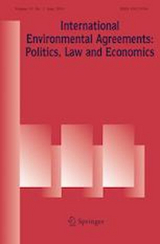Externe Publikationen

Does orchestration in the Global Climate Action Agenda effectively prioritize and mobilize transnational climate adaptation action?
Chan, Sander / Wanja AmlingExterne Publikationen (2019)
in: International Environmental Agreements: Politics, Law and Economics 19, 429-446
DOI: https://doi.org/10.1007/s10784-019-09444-9
Information
Climate change adaptation is increasingly seen as a question that involves globally connected vulnerabilities and impacts which necessitate transboundary action by non-state and subnational (transnational) actors. Traditional actors such as governments and international organizations leave deficits in norm development, enforcement, capacity building, and financing. Orchestration has been suggested under the functionalist assumption that transnational actors can make up for these deficits, through optimizing complementarity between the realms of international and transnational governance and through eliciting more action toward the achievement of globally agreed climate goals. In the context of the United Nations Framework Convention on Climate Change (UNFCCC), orchestration has taken the form of an evolving Global Climate Action Agenda (GCAA). Few studies have examined the role of orchestration in bolstering transnational adaptation. This article therefore asks: Has the GCAA effectively mobilized and prioritized transnational adaptation action? Further, has it effectively addressed functional, participatory, and geographic deficits? Analyzing a unique dataset of a hundred cooperative climate actions, this study finds that current patterns are incongruent with some functionalist expectations. GCAA orchestration has featured a political prioritization of both adaptation and mitigation and a focus on building a positive narrative of climate action. This combination of priorities has led to neglect of underperforming actions—many of them adaptation actions in developing countries. Subsequent iterations of the GCAA failed to recognize these actions and did not identify support needed for them. This has strengthened the bias toward mitigation aspects of climate change and exacerbated imbalances in the geography of transnational action under the GCAA.
Kontakt
Cornelia Hornschild
Koordinatorin Publikationen
E-Mail Cornelia.Hornschild@idos-research.de
Telefon +49 (0)228 94927-135
Fax +49 (0)228 94927-130
Alexandra Fante
Bibliothekarin/Open Access-Koordinatorin
E-Mail Alexandra.Fante@idos-research.de
Telefon +49 (0)228 94927-321
Fax +49 (0)228 94927-130



